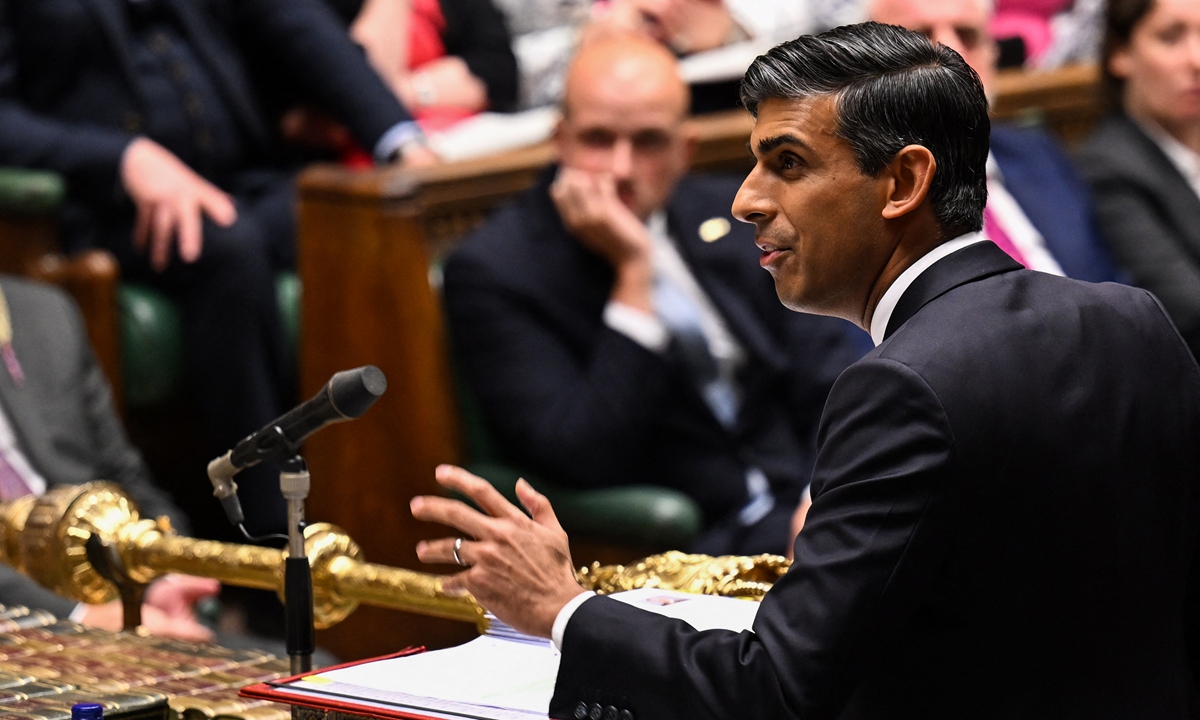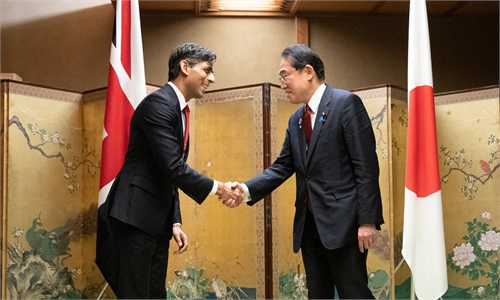
A handout photograph released by the UK Parliament shows Britain's Prime Minister Rishi Sunak speaking during Prime Minister's Questions (PMQs), in the House of Commons, in London, on September 13, 2023. Photo: AFP
British Prime Minister Rishi Sunak said on Thursday that he is "acutely aware of the particular threat to our open and democratic way of life" posed by China, in response to a damning report on the UK's China strategy by Parliament's Intelligence and Security Committee. The PM also promised that the ministers would take "all necessary steps" to protect the country from foreign state activity. These remarks are not only irrational and disrespectful, but also reflect the inferiority, sensitivity and anxiety that British politicians have about China. Moreover, their words are also filled with subconscious arrogance, and remind us of the historical pain of countries that have been colonized by the West.It is undeniable that Sunak made this speech in a special context. Due to the festering of the "China spy" incident, he is facing tremendous pressure from parliament and public opinion, and has been criticized for being "too soft" on China. This incident, fuelled by some people, even set off a political and public opinion storm. Some of the contact and reconciliation with China promoted by the Sunak administration not long ago has been fiercely questioned and rejected. Radical voices demanding that China's classification be changed from a "challenge" to a "threat" have caused a great clamor. Under such circumstances, speaking "harsh words" on China has become a cheap option for British politicians looking to deflect conflict. In fact, this is a display of real weakness and irresponsibility.
If the "China threat theory" is divided into levels, then slandering China as a "threat" to the Western "lifestyle" is the highest and most inflammatory level. It seems that the lives of everyone in this country are shrouded in the shadow of the "China threat," and a sense of tension arises spontaneously. Lifestyle is generally considered to be the most important thing in the US and Western countries. Shouting slogans to "defend our way of life" will immediately generate powerful mobilization. The so-called openness and democracy are listed as the core of Western values in their lifestyles, and interference by others will not be allowed. Being self-conscious is not enough to describe the mentality of Western countries that seems inexplicable to non-Western countries.
So how does China threaten Britain's "open and democratic way of life?" Does this mean that China provides plenty of high-quality and low-priced products to Britain, or bring considerable income generation and jobs to the UK in the fields of tourism, education, clean energy and so on? Not to mention the fact that the UK, once the largest empire in the world, originally built its so-called "open and democratic way of life" on plunder and exploitation of other developing countries. This way of life carries the disgraceful mark of colonialism and the extreme arrogance of Western centralism. What is it worth to show this off in the 21st century?
Like all developing countries, China has no interest in interfering with, altering, or "threatening" the way of life of Western nations. A longstanding global issue is that Western countries have never truly respected the way of life of non-Western nations. To say that they "threaten" it is an understatement; Western nations' interference, forced transformation, and even destruction of non-Western ways of life are a major source of instability and unrest in the world.
In fact, the UK is one of the least qualified countries in the world when it comes to accusing other nations of interference. To this day, it has not learned to respect and learn from different civilizations and ways of life. For example, it concocted the Hong Kong-related legislation, smeared China's policy on Hong Kong, arrogantly criticized the law enforcement actions of the Hong Kong police, and shielded and supported anti-China elements in Hong Kong. It has also meddled in Xinjiang affairs, using allegations of "forced labor" to undermine Xinjiang's industries and threaten the livelihoods and employment of the people there. Whenever it can, the UK interferes in China's internal affairs, such as Taiwan, Xizang, and human rights. If China were to do something similar to the UK, one can only wonder how strongly the UK would react - it might even turn the roof of 10 Downing Street upside down.
"Openness and democracy" are not terms exclusive to the West. In the eyes of people in non-Western countries, the primary aspects of the British way of life are not the politically tinted notions of "openness and democracy," but rather the ease of earning a higher income without excessive toil, the leisurely tradition of afternoon tea, and the sense of superiority in commenting on others' lives, among other things. Many of these elements benefited from the colonial era. The most profound unease felt in Western countries actually stems from the strong calls for reform in the international political and economic order by developing countries, along with the belief that Western nations need to pay their historical and moral debts. China, as the world's largest developing country, has seen the most remarkable development in recent years, triggering the strongest apprehension among Western nations, which view it as a "stand out." This is the reality behind the concept of the "China threat."
The contrast between the former glory of the British Empire and the present reality of the UK has generated a sense of loss and anxiety among many British political elites. It has also led to a gradual distortion in the UK's diplomacy and perception of China. China is not a threat to the UK, nor does it pose a threat to the British way of life. China is a partner for cooperation and a source of development opportunities for the UK. As long as the British people can fully break free from the psychological dependence on plunder and superiority, and approach this with a genuinely open and inclusive mindset, it is not difficult to see this reality.

